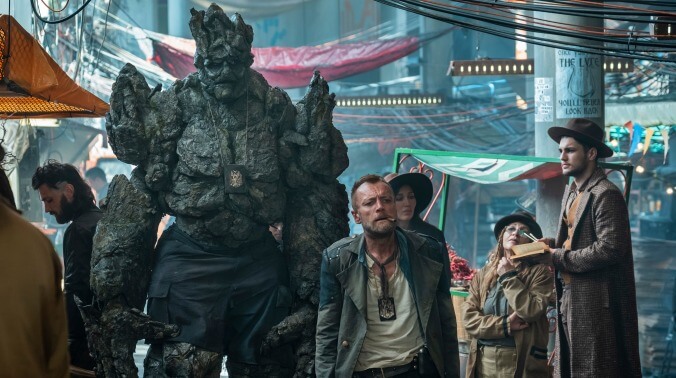Let’s dispense with the fan-focused stuff, first: People hoping to get a glossy TV version of Discworld are going to come away with more irritation than “ah”s of recognition. (To be fair, the show’s creators have been upfront about the fact that such hopes weren’t likely to be fulfilled.) Yes, the lead character is still Night Watch Captain Sam Vimes (played by Game Of Thrones’ Richard Dormer, in a performance that appears to have lifted more than just the eyeliner from some of Johnny Depp’s latter-day Pirates roles). The setting is still Ankh-Morpork, a mishmash of fantasy tropes, 19th-century London socioeconomics, and rampant magical invention. And the loose structure of the plot (time-traveling criminal unleashes fire-breathing dragon on the city, incompetent cops investigate) mimics beats taken from 1989’s Guards! Guards! and 2002’s Night Watch. But Pratchett’s finely judged Industrial-Revolution-but-there-are-dwarves satire has been largely stripped out, replaced by brutalist architecture, electric lights, and a lot of hand-waving about wizards stealing technology from our world, apparently to cover for the fact that this sprawling fantasy city looks largely like a series of disused industrial parks. A character here or there may look or sound right. Anna Chancellor gives a great performance as city ruler Havelock Vetinari, and Wendell Pierce’s voice performance as series mainstay Death is, if not immediately recognizable, then at least distinct. But as a Discworld show, The Watch is largely a failure.
Unfortunately, it’s not especially great as the show it’s actually trying to be either. Largely serialized, The Watch runs into a problem that often afflicts its ilk: The need for each episode to have some kind of emotional climax in order to make everything feel complete. In this case, these moments tend to wildly clash with the show’s tone, a tricky little thing that seems to be wriggling between outright satire of its own form, and a sincere commitment to same. It’s funny, for instance, when Dormer’s Vimes gives an inspirational speech to his underlings… and then another… and then we smash-cut to him still rambling hours later. But it doesn’t make all those other, more sincere “We’re all in this together” speeches feel any less pat. None of which is helped by the show’s comedy writing, which could best be described as “enthusiastic,” rather than “successful.” Where last year’s Good Omens inelegantly translated Pratchett’s light and sardonic prose to the screen by having Frances McDormand literally read the novel to the audience, The Watch cribs via extended exposition, to not much better effect.
Some of that heavy lifting is expected, given the way the author’s satirical sense is baked into the very world the show operates in. (Pratchett’s approach to thievery in Ankh-Morpork—i.e., legalize, regulate, and tax the thieves—is a hard thing to express in a couple of quick lines.) But it doesn’t make any of it any less clunky, or the cast’s attempts to toss off jokes that worked far better in print more successful. The fact of the matter is that, despite its best and continued efforts, The Watch is only rarely funny, which, when said about a show even loosely based on Discworld, is something approximating a crime.
It’s not all dire. Dormer can be great when he keeps himself atop the roiling ball of actor’s tics he’s saddled himself with, and the rest of the cast typically follows suit: Lara Rossi is undeniably charismatic as dragon-wielding terrorist Lady Sybil Ramkin, Marama Corlett is understated but effective as The Watch’s most capable werewolf, and Jo Eaton-Kent gives what will hopefully be a breakout performance as self-assured forensics officer Cheery. The cast is there, and so is the heart, coming at Pratchett’s favorite themes of humanism and empathy from oblique and sometimes fascinating angles. It’s the words and the look of the thing—striking, but wildly inconsistent—that let the program down.
It’s difficult to figure out who the hell The Watch is for. It’s not for fans of the books it’s based on. It’s not for fans of cop shows (too anarchic and disorganized). It’s not for punks, because, well, the cops. And, to be fair, there are moments when the series is able to convert that “Fuck you, we’re making the show we like” spirit into an asset, as in its third episode, which sees The Watch form its own literal punk band for no real reason other than the people making the show thought it would be fun. (It is.) But sometimes punk-rock anarchy is indistinguishable from simple, tuneless thrashing, and that’s a pitfall The Watch falls into more often than not. It’s worth a watch, if only to see if you’re the person BBC America has made it for. But don’t be surprised if it doesn’t turn out to be the watch for you.



 Keep scrolling for more great stories from A.V. Club.
Keep scrolling for more great stories from A.V. Club.